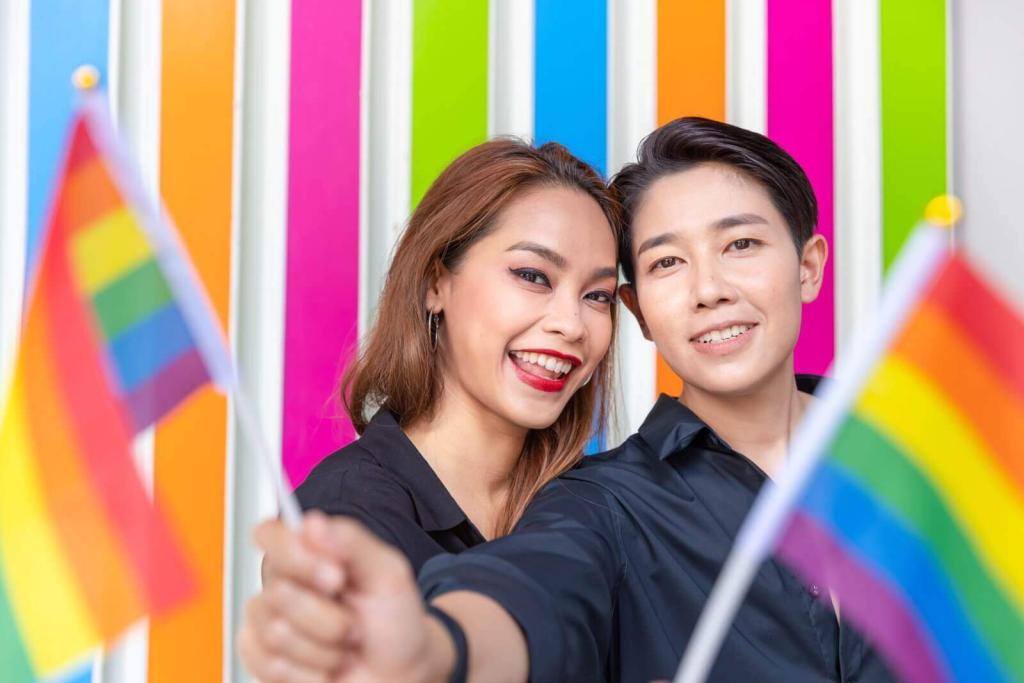In today's ever-evolving society, understanding and acceptance of diverse relationships are becoming increasingly important. One of these diverse relationships might involve dating a ladyboy. This article aims to guide you through the process of talking to your friends about your relationship with a ladyboy. We'll explore various aspects, including understanding ladyboys, why openness is crucial, and practical steps to take when broaching the topic with friends.
Why it's important to talk to friends about dating a ladyboy
It's essential to discuss your relationship with a ladyboy with friends to create a supportive and understanding environment. By addressing misconceptions and fostering open conversations, you can ensure that your circle of friends becomes more inclusive and accepting, contributing to a healthier and happier relationship.
Who are ladyboys and why they prefer to be called so
Ladyboys, primarily known as kathoeys in Thailand, are transgender women or effeminate gay men who identify and live as women. In many Asian cultures, the term "ladyboy" has become a popular way to refer to transgender women. This term is generally preferred over others as it accurately reflects their gender identity and expression. However, it is essential to recognize that some individuals might prefer other terms, such as "transgender woman" or "trans woman," so it's always a good idea to ask about their preferred terminology.
Common misconceptions and stereotypes surrounding ladyboys
There are several misconceptions and stereotypes about ladyboys that people might hold. Some people believe that ladyboys are solely sex workers or promiscuous individuals, but these assumptions are not accurate. Like anyone else, ladyboys have diverse career paths and personal lives. They are teachers, doctors, artists, and professionals in various fields.
Another misconception is that ladyboys are "confused" about their gender identity or just "going through a phase." This assumption is also unfounded, as gender identity is a deeply ingrained aspect of a person's self. Ladyboys, like other transgender individuals, have a strong and persistent sense of their gender that differs from their assigned sex at birth. It's important to respect and validate their identity as you would for any other person.
Finally, some people might think that relationships with ladyboys are inherently dysfunctional or unstable. However, this idea is simply not true. Just like any other relationship, the foundation for a healthy and stable partnership with a ladyboy lies in love, trust, communication, and mutual respect.
Cultural and societal perspectives on ladyboys
Cultural and societal perspectives on ladyboys vary across different regions and communities. In some cultures, like Thailand, ladyboys have a more recognized and accepted place within society. They are often visible in entertainment, fashion, and ladyboy beauty pageants, contributing to the rich tapestry of Thai culture. However, even in these relatively more accepting societies, ladyboys might still face discrimination, marginalization, and challenges in various aspects of their lives.
In other regions, ladyboys and transgender individuals might face more significant challenges and discrimination. It's crucial to recognize that the acceptance and understanding of ladyboys and transgender people are an ongoing process. By educating ourselves and engaging in open conversations, we can contribute to a more accepting and inclusive society for all.
In the next sections, we will discuss why it's essential to be open about your relationship, how to start the conversation, and the benefits of doing so. The information provided will help you approach this topic with confidence, understanding, and empathy.
Why honesty is the best policy when it comes to relationships
Honesty is the cornerstone of any healthy relationship, and being open about your relationship with a ladyboy is no exception. By sharing this information with your friends, you create a foundation of trust and transparency, which can foster deeper connections with those around you. When you are open about your relationship, you give your friends the opportunity to support and understand you, as well as to learn and grow from your experiences.
The benefits of being open about your relationship with your friends
There are several benefits to being open about your relationship with a ladyboy. Firstly, it can help dispel any misconceptions or stereotypes that your friends may have about ladyboys, fostering a more inclusive and understanding environment. Secondly, being open allows your friends to provide emotional support, which is essential for the well-being of both you and your partner. Finally, being open with your friends about your relationship can lead to a more profound and more meaningful connection with them.

How to Start the Conversation: Choosing the right time and place
Initiating a conversation about your relationship with a ladyboy can feel intimidating. To make the process easier, consider choosing a time and place where you feel comfortable and relaxed. Opt for a quiet, private setting where you can talk without distractions or interruptions. It might be helpful to arrange a one-on-one meeting with each of your friends or have a small gathering if you feel confident in discussing the matter with a group.
Preparing what you want to say
Before starting the conversation, it's essential to prepare what you want to say. Reflect on your relationship, your partner's identity, and your reasons for sharing this information with your friends. Make a list of key points that you want to address, such as your partner's preferred pronouns, how you met, and why you believe this relationship is meaningful. It can also be helpful to anticipate questions your friends may have and prepare honest, thoughtful responses.
Anticipating their reactions
It's important to remember that your friends may have a range of reactions when you tell them you're dating a ladyboy. Some may be supportive and understanding, while others may feel confused or uncomfortable. Be prepared for a variety of responses and give your friends space and time to process the information. Offer resources or educational materials if they express an interest in learning more about ladyboys and transgender issues. Remain patient and empathetic, and remember that your friends' reactions may evolve over time as they gain a better understanding of your relationship.
Common negative reactions and how to respond to them
Despite your best efforts, some friends may have negative reactions to the news that you're dating a ladyboy. Common negative reactions might include disbelief, confusion, concern, or even anger. To respond to these reactions, it's essential to remain calm and patient. Address any misconceptions or stereotypes your friends might have, and emphasize the importance of respecting your partner's identity and your relationship. Remind them that love, trust, and respect are the foundations of any healthy relationship, regardless of gender identity.
How to address any misunderstandings or misconceptions
When addressing misunderstandings or misconceptions, it's crucial to provide accurate information and resources. Share your personal experiences and what you've learned about ladyboys and transgender issues. Encourage your friends to educate themselves and offer suggestions for books, documentaries, or websites that can help them better understand your partner's identity and your relationship. Remember that change can take time, and your friends may need some space to process the information and adjust their perspectives.
How to deal with concerns about what others might think
One of the challenges of ladyboy dating is dealing with the potential judgment or prejudice from others. It's essential to acknowledge these concerns but remember that what matters most is the love and support you and your partner share. Focus on building a strong, loving relationship, and surround yourself with people who love and support you. To help your friends understand, share your experiences and discuss the importance of embracing diversity and overcoming societal expectations. Here is a helpful resource for educating yourself and others about transgender issues and supporting the transgender community.
Discussing how to handle public reactions and staying safe
It's important to have open conversations with your partner and friends about handling public reactions and maintaining safety. Discuss strategies for dealing with potential confrontations or discrimination, such as remaining calm, seeking help from allies, or leaving the situation if necessary. Establish a support system of friends and family who can offer assistance in difficult situations. Additionally, familiarize yourself with local laws and protections for transgender individuals to ensure you and your partner are aware of your rights.
How to introduce your ladyboy partner to your friends
Introducing your ladyboy partner to your friends is a significant step in your relationship. To make the introduction smooth, provide some context beforehand by sharing information about your partner, their interests, and their gender identity. When the time comes, choose a comfortable and relaxed setting, such as a dinner party or casual gathering. Encourage open communication and create an atmosphere where your partner and friends feel at ease getting to know each other.
How to address any confusion or misunderstanding about your partner's gender identity
During the introduction, some confusion or misunderstanding about your partner's gender identity might arise. Address these concerns calmly and respectfully, providing accurate information and clarifying any misconceptions. It's crucial to respect your partner's preferred pronouns and names, and politely correct your friends if they make mistakes. Offer resources or guidance for those interested in learning more about gender identity, and encourage open, honest conversations.
How to Support Your Ladyboy Partner Through This Process
Supporting your partner as they navigate relationships, societal expectations, and potential discrimination is essential. To be an ally, educate yourself about transgender issues and the unique challenges ladyboys face. Listen to your partner's experiences, validate their feelings, and offer emotional support. Stand up against prejudice and discrimination when you witness it, and use your voice to promote understanding and acceptance. Joining support groups or online communities can also provide valuable resources and connections for both you and your partner.
How to help them navigate any challenges that may arise
Helping your partner navigate challenges involves being present, empathetic, and proactive. Offer your support in addressing any issues they may face, such as seeking medical care, updating legal documents, or confronting discrimination. Work together to develop strategies for coping with stress and maintaining mental health. Encourage open communication, and ensure your partner knows that they can rely on you for support and understanding.
Tips for Meeting Your Ladyboy Partner's Friends
Meeting your partner's friends can be both exciting and nerve-wracking. To prepare, take the time to learn about their friends' interests, backgrounds, and the nature of their relationships. Ask your partner about any specific topics or issues to avoid or be aware of, and be prepared to share information about yourself and your relationship. Remember to be yourself, be respectful, and show genuine interest in getting to know your partner's friends.
How to handle any negative reactions from their friends
Negative reactions from your partner's friends can be challenging to navigate. If you encounter resistance or judgment, remain calm and respectful. Avoid escalating the situation by engaging in arguments, and instead, focus on finding common ground and promoting understanding. Encourage open dialogue, and be prepared to address any misconceptions or prejudices. Remember, it may take time for some individuals to adjust and accept your relationship. In the meantime, focus on strengthening your bond with your partner and fostering connections with supportive friends.

Why it's important to keep an open mind
Keeping an open mind is crucial when dating a ladyboy or engaging in any relationship that challenges societal norms. Being open-minded allows you to grow as a person, learn new perspectives, and build stronger connections with others. Embracing diversity and challenging prejudices contribute to creating a more inclusive and understanding society. By maintaining an open mind, you pave the way for acceptance, not only for yourself and your partner but also for others who face similar challenges.
How to approach any misconceptions or prejudices you may have
It's essential to recognize and confront any misconceptions or prejudices you may have regarding ladyboys. Start by educating yourself on transgender issues, and consider engaging in conversations with others who have different experiences and perspectives. Reflect on your biases and strive to challenge them by seeking out accurate information and broadening your understanding. By doing so, you can foster a more inclusive mindset and become a better ally to your partner and the transgender community.
How to talk to your family about your ladyboy relationship
Talking to your family about dating a ladyboy may be difficult, but being open and honest is crucial. Choose an appropriate time and place to have the conversation, and be prepared to address their questions, concerns, and emotions. Share information about your partner, their gender identity, and the love and support you share. Encourage open dialogue, and offer resources for those interested in learning more about transgender issues.
How to deal with any negative reactions from family members
Negative reactions from family members can be disheartening, but it's essential to approach the situation with patience and understanding. Recognize that it may take time for some family members to adjust and accept your relationship. Continue to share your experiences and promote understanding, and seek support from family members who are more accepting. In some cases, it may be beneficial to involve a professional counselor or therapist to help navigate these conversations and facilitate understanding.
Recap of the importance of being open and honest about your relationship
In conclusion, being open and honest about dating a ladyboy is essential for building strong relationships with friends and family, fostering understanding, and promoting acceptance. By addressing misconceptions, challenging prejudices, and sharing your experiences, you pave the way for a more inclusive and supportive environment for both you and your partner.
Reiterating the benefits of seeking support from communities
Seeking support from communities, both online and offline, can provide valuable resources, connections, and understanding for you and your partner. By engaging with others who share similar experiences, you can learn from one another, offer guidance, and work together to promote a more inclusive society. Remember, you're not alone, and there are countless people and organizations dedicated to supporting transgender individuals and their loved ones.
Frequently Asked Questions
In this article, we've discussed various aspects of dating a ladyboy and how to navigate conversations with friends and family. As a summary, we've compiled a list of frequently asked questions that address common concerns and provide helpful insights.
How do I know if I'm attracted to a ladyboy?
Attraction is a complex and personal experience. If you find yourself attracted to a ladyboy, it's essential to acknowledge and respect your feelings. Remember that attraction is about more than just physical appearance; it can also involve emotional, intellectual, and social connections.
What should I do if my friends or family don't accept my relationship?
If your friends or family don't accept your relationship, it's essential to approach the situation with patience and understanding. Continue to share your experiences, promote understanding, and seek support from those who are more accepting. In some cases, involving a professional counselor or therapist may be beneficial to help navigate these conversations and facilitate understanding.
How do I handle public reactions to my relationship?
Handling public reactions to your relationship involves being prepared for potential confrontations or discrimination. Develop strategies for dealing with these situations, such as remaining calm, seeking help from allies, or leaving the situation if necessary. Establish a support system and familiarize yourself with local laws and protections for transgender individuals.



